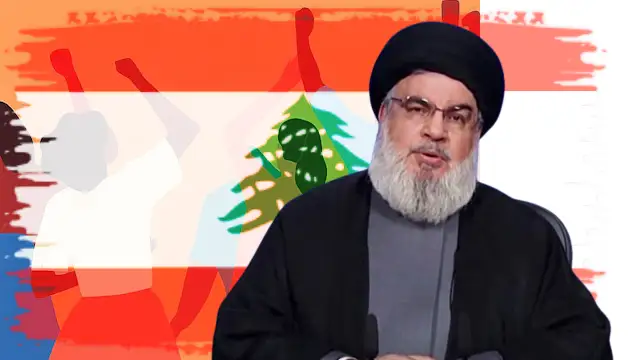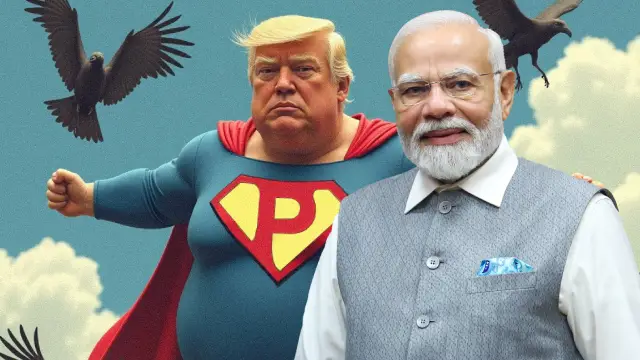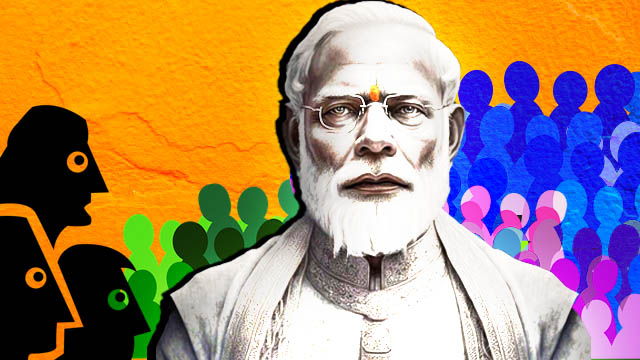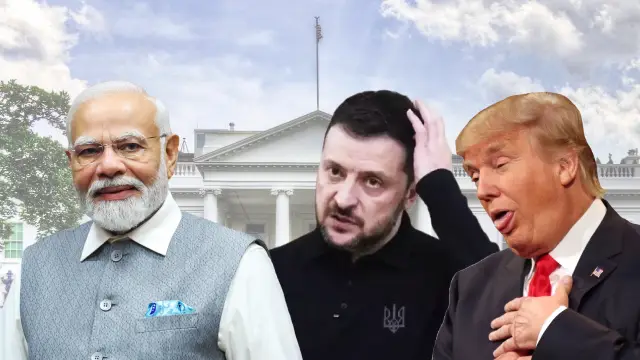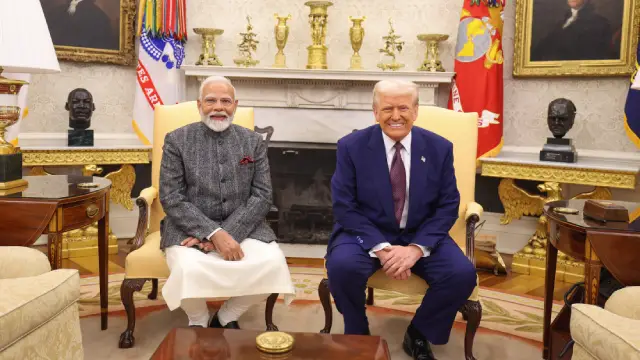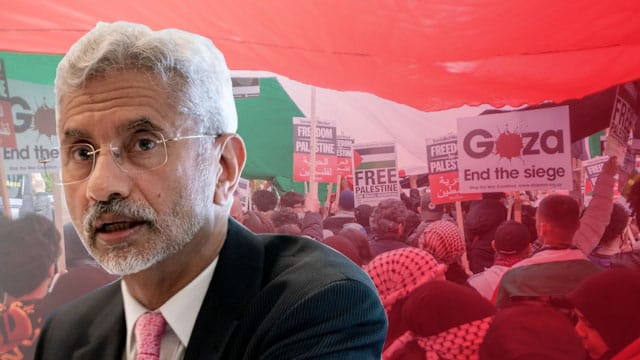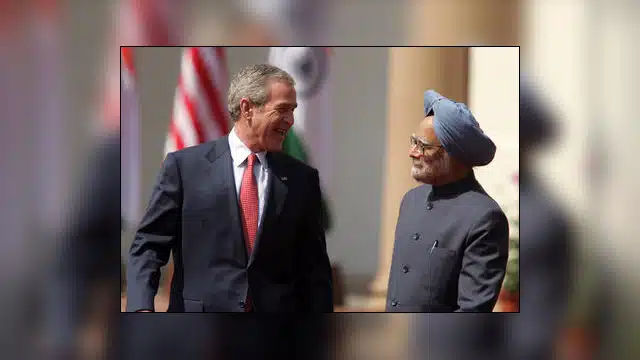The killing of Sayyed Hasan Nasrallah (64), the iconic secretary-general of Lebanon’s resistance organisation Hezbollah, has been one of Israel’s latest victories in its war against the regional resistance organisations backed by Iran. Mr Nasrallah’s killing on the night of Friday, September 27th, in the Israel-Hezbollah conflict, has caused significant trouble for India, which has been a non-player in the conflict.
Mr Nasrallah’s killing, like his legacy, became a polarising event. With one section of the world mourning him, another rejoicing the bloodshed. India, which shares warm relations with Lebanon, is trapped between them.
In India, far-right Hindutva-incensed activists, closely aligned with Prime Minister Narendra Modi’s federally-ruling Bharatiya Janata Party (BJP), cheered the incident and mocked the Iran-backed resistance.
Its left-wing forces condemned the killing and accused Israel of expanding its aggressive war.
While Indian non-aligned foreign policy refrains from taking sides in such crucial times to balance its relations with all parties, the domestic political rhetoric promoted by Mr Modi’s brand of far-right Hindu nationalism is jeopardising the country’s traditional ties with not just the Arab world, where Mr Nasrallah was a legendary figure, also with its partners in multilateral organisations like BRICS+ and Shanghai Cooperation Organization.
Laced with vitriol, the general celebration of Mr Nasrallah’s killing in the Israel-Hezbollah conflict projects India poorly as a large number of countries condemn the Israeli attacks on Lebanon that have killed hundreds of civilians and are escalating tensions to a dangerous level.
Why is cheering Nasrallah’s killing problematic?
For the Hindutva-incensed Indian far-right, any Muslim man who leads an organisation against Israel or the US-led collective West and fights their neo-colonial aggression can be labelled as “terrorist”.
Due to their constant propaganda, backed by a battery of subservient mainstream media’s biased coverage, many Indians fail to see the conflict of West Asia objectively and fall into the Islamophobic trap.
Except for the Anglo-Saxon world and Israel, Mr Nasrallah and Hezbollah didn’t feature as terrorists anywhere.
Mr Nasrallah, under whose leadership Hezbollah fought the Israelis to achieve liberation in 2006 and who had been heading the organisation since the killing of its former secretary general in 1992, had been a key political figure of the modern Lebanese state, with which India has stable bilateral relations and enjoys a positive bilateral trade surplus.
As a key political figure in Lebanon, where Hezbollah is a registered political entity, Mr Nasrallah played a positive role in uniting the country and ensuring ethnic harmony between different communities of the country, unlike what a terrorist—which the Indian far-right universe labels him as—would do.
Much to the surprise of the Indian far-right, it was Hezbollah that helped the Syrian Arab Army defeat ISIS and crush the terrorist organisation in the region.
ISIS was a key player in the Syrian civil war and fought against President Dr Bashar al-Assad’s government at the behest of the West and a regional entente.
Much to their surprise, India, even under Mr Modi, supported Dr Assad’s government and it was in New Delhi’s strategic interest that the ISIS menace was destroyed in Syria, much before it could do more harm to the region and beyond.
Hezbollah, along with the Syrian Arab Army, Russian Air Force and Iran, are credited for the destruction of the most ferocious terrorist force of the 21st century. A fact that the Indian right wing will conveniently ignore, much to the inconvenience of India.
Apart from Syria, Mr Nasrallah’s Hezbollah also prevented ISIS from reaching Lebanon.
Hezbollah, along with the Lebanon Armed Forces, intensely fought and eliminated the terrorists at Lebanon’s borders.
Mr Nasrallah’s anti-terror campaigns, rather than “terrorism”, made him popular, not just among the Shiite, but beyond religious affiliations and Lebanon’s borders.
Mr Nasrallah’s killing in the Israel-Hezbollah conflict has been condemned and mourned by several countries of West Asia and beyond. India shares a cordial relationship with most of them.
Countries that condemned Nasrallah’s killing
One of the major countries that condemned Mr Nasrallah’s killing is Russia, with which India has strategic ties. Moscow even shares warm relations with India’s far-right forces and its international media outlets often glorify Mr Modi for which the far-right universe hails Russia.
Ironically, in a strongly-worded statement, Moscow has condemned the assassination of Mr Nasrallah, much to the dismay of the Indian right-wing camp.
“This is yet another political assassination committed by Israel, and Russia condemns it with great resolve. This forceful action has the potential to entail even more dramatic consequences for Lebanon and the Middle East in general. Israel was definitely aware of this danger. Nevertheless, it took this step and started killing Lebanese citizens, which will almost inevitably provoke a new outburst of violence. Therefore, it bears full responsibility for the ensuing escalation,” the Russian Ministry of Foreign Affairs said in its statement.
Russia has asked Israel to immediately cease its violent aggression to prevent a major catastrophe in the region.
Recently, during the United Nations General Assembly (UNGA) in New York, Indian External Affairs Minister S Jaishankar met his Venezuelan counterpart Yvan Gil and discussed deepening India-Venezuela bilateral ties.
The same Venezuela, a supporter of Palestinian liberation, strongly condemned Mr Nasrallah’s killing by Israel.
“They want to justify it, but to assassinate him, they attacked buildings, housing estates and killed hundreds of people. There’s a word for this: crime,” Venezuelan President Nicolas Maduro said.
India has been emphasising renewing its ties with Dr Assad’s government and in July 2023, after a gap of seven years, former minister of state for external affairs V Muraleedharan visited Damascus.
The same Dr Assad has strongly condemned Mr Nasrallah’s killing and the aggression of Israel.
In a letter to the Lebanese resistance, Mr Assad highlights, “The resistance does not weaken with the martyrdom of its leader, but rather remains firmly rooted in the hearts and minds, because great leaders build in their lives the doctrine of struggle, its approach and its path, and they depart leaving behind them an intellectual system and a practical approach to resistance and honour.”
The Indian right wing doesn’t bother that Dr Assad’s government supports India’s stand on the disputed territory of Jammu & Kashmir, while India supports Syria’s rights on the Golan Heights occupied by Israel.
Despite the recent hiccup over Iranian Supreme Leader Ayatollah Seyyed Ali Khamenei’s tweet highlighting the plight of Indian Muslims, which India’s Ministry of External Affairs had condemned, India-Iran bilateral relations remain extremely strong.
Iran has most strongly condemned Mr Nasrallah’s killing in the Israel-Hezbollah conflict. The Ayatollah said, “The Islamic world lost a great personality, the resistance front lost a prominent standard-bearer, and Hezbollah lost an unparalleled leader.”
The newly-elected Iranian President Dr Masoud Pezeshkian has offered his condolences over the killing of the Hezbollah leader and asserted that it will strengthen the resistance.
Incidentally, Iran has confirmed that its military advisor Brigadier General Abbas Nilforoushan (58) was killed along with Mr Nasrallah in the same airstrike.
Iraq, India’s seventh-largest trade partner in the financial year (FY) 2023-24, with which India’s bilateral trade was $33.32bn, has also strongly condemned Mr Nasrallah’s killing in the Israel-Hezbollah conflict. Iraqi Prime Minister Mohammed Shia’ Al-Sudani has called the attack “criminal” and accused Israel of having a reckless desire to engulf the whole region in the conflict.
Other friendly countries of India like Cuba, Saudi Arabia, South Africa, etc, have also strongly opposed Mr Nasrallah’s killing in the Israeli airstrike.
Even western countries like France and Germany have raised their concerns over Israel’s aggression and have asked it to de-escalate immediately.
India’s Ministry of External Affairs, caught between its international non-alignment policy and domestic compulsion to support the Hindutva camp, remained mum on the devastating attacks on Lebanon.
One of the reasons that Indian far-right has been celebrating Mr Nasrallah’s killing in the Beirut bombing is because of their lack of understanding —or vehement opposition—regarding the role resistance plays in a colonised setup.
The idea of resistance
Divorced from the realities of colonial exploitation and oppression for nearly eight decades, many in India may not comprehend what’s a resistance organisation and why colonised people need it.
They may not realise how resistance organisations across the global south have fought colonial and neo-colonial aggressions and won victories, even the most unimaginable ones like in Vietnam and South Africa.
The realisation of Palestine’s colonisation and the anticipation of Israel’s evolution from a Jewish state to a violent Zionist aggressor ensured that Mahatma Gandhi and his disciple Jawaharlal Nehru, the first Indian prime minister, opposed the formation of Israel and stood with Palestine.
India’s present dispensation has pushed Mr Gandhi and Mr Nehru’s visions to oblivion.
Moreover, due to years of Islamophobic propaganda, the majority of Indians have been taught to recognise Muslim-led resistance organisations as terrorist forces.
Although India has not designated Hezbollah as a terror organisation—and neither has any other country except the US-led Anglo-Saxon bloc that a section of the Hindutva camp considers as India’s enemy—the far-right forces haven’t stopped calling it “terrorist”.
It indicates a disturbing trend that rather than Indian foreign policy and the overall ideology of the state, the BJP’s soldiers like to rely more on Zionist propaganda and find respite there.
The failure of the state
The reluctance of the Indian state to prevent such acts that can hamper India’s relations with friendly countries expresses the disarrayed state of foreign policymakers and how the much-hyped balancing act of Mr Modi is giving way to a fall into an abyss.
In appeasing the ruling party’s social media campaigners and influencers, India can’t ignore that it has greater business interests in West Asia.
The top five trading partners of India in FY 2023-24 consisted of two Gulf monarchies—Saudi Arabia and the UAE, with which India had trade worth $42.97bn and $83.65bn, respectively. But this doesn’t mean the situation can’t change.
Greater trade in the past doesn’t mean that India’s unapologetic alliance with Israel, even on an ideological level won’t impact its future trading prospects.
There are eight countries, including Iraq, Saudi Arabia, Türkiye and the UAE, among the top 30 countries with which India traded in FY 2023-24. Israel isn’t among them. This shows how, even from a business point of view, the idea of supporting the Zionist power is not a profitable one for India, except for rhetoric mongering.
Moreover, in recent years, India has faced sharp criticism from the Arab world for the persecution of Muslims and the rampant Islamophobic vitriol spread by the ruling Hindutva camp.
Most of the time, the government had to explain itself to the disgruntled Muslim countries of the Middle East. With such rampant show of disdain for the Arabs by the Hindutva camp, even if the government-to-government relations sustain their warmth, a deep fissure will appear when it comes to people-to-people ties, which can have negative repercussions for India as a large section of its workforce lives and earns a livelihood from the Middle East.
But there won’t be justice if the blame is simply laid on the BJP leaders and supporters. The rot has a root somewhere else.
The root of the dichotomy
Recently, Mr Modi met Palestinian President Mahmoud Abbas in New York and shared India’s concerns over the sufferings of the Palestinians. Mr Modi reiterated India’s commitment to a free Palestinian state according to the two-state solution and stressed that only that can resolve the issue permanently.
However, a few days before the meeting, India was among the 43 countries that abstained when several countries moved a resolution demanding Israel to end its illegal occupation of Palestinian land within 12 months. The resolution was passed with 124 votes in favour.
Why did India abstain? What was at stake?
This brings us to a very disturbing part of India’s foreign policy.
Under Mr Modi, the Opposition alleges, the government has turned into an extended business development arm of a few chosen conglomerates perceived as close to the prime minister.
Under the aegis of the US, India has become a part of the India-Middle East-Europe Economic Corridor (IMEC). The IMEC entails an alternative to China’s Belt-Road Initiative.
It includes the transport of cargo from India’s Mundra Port in the state of Gujarat and Mumbai Port in the state of Maharashtra to the UAE.
From the UAE the cargo will be transported by railway to Israel’s Haifa Port through Saudi Arabia. From Haifa Port the cargo will be shipped to Greece or Italy, the gateways to Europe.
Now, India’s Mundra Port is owned by Gautam Adani, who owns the port-to-power conglomerate Adani Enterprises. Mr Adani, the Opposition alleges, is close to Mr Modi and the latter allegedly formulates policies to help his businesses.
In 2022, Mr Adani bought 70% stakes in the Haifa Port, much before it was considered for the IMEC officially.
Now, with Mr Adani’s stake, IMEC appears as a must-do project for Mr Modi, despite a lot of logistical and technical challenges on the way.
Due to the emphasis on Haifa Port and to stay aligned with the US-led Anglo-Saxon lobby, New Delhi has been betraying its traditional stand, which Mr Modi utters but doesn’t practice, on Palestine.
With his hypocrisy acting as an inspiration, it’s normal to expect the BJP’s rank and file following Mr Modi’s footsteps.
Indian foreign policy, which also has roots in anti-colonialism and non-alignment, has always helped it gain immense respect and a strong foothold in the Arab world, despite its arch-rival Pakistan using the Muslim card.
With the rabid Hindutva fanatics rejoicing Mr Nasrallah’s killing in the Israel-Hezbollah conflict and Mr Modi exhibiting rare hypocrisy on the question of peace and stability, India’s future endeavours in the Middle East may face uncertainties.
Whether India can tread this treacherous course under Mr Modi is a big question at the moment.
Tanmoy Ibrahim is a journalist who writes extensively on geopolitics and political economy. During his two-decade-long career, he has written extensively on the economic aspects behind the rise of the ultra-right forces and communalism in India. A life-long student of the dynamic praxis of geopolitics, he emphasises the need for a multipolar world with multilateral ties for a peaceful future for all.

